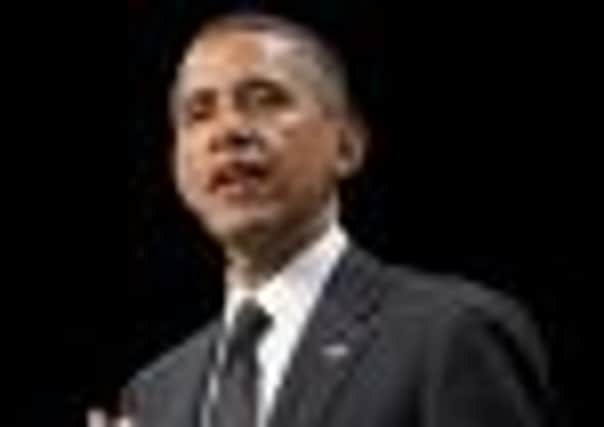Graeme Thomson: US election will be fought on fathers’ words


SPEAKING during the Republican primary campaign in April, Mitt Romney assured an audience in Missouri that, as president of the United States, the constitution would be his “guide” and the Declaration of Independence his “compass”.
By identifying in America’s founding documents an indispensable blueprint for governance, Romney was upholding a long-established theme in the rhetoric of those who have held and contested the presidency. These documents are regarded by Americans with an almost religious devotion, revered not only as the founding charters of their nation but, more essentially, as the primary source of national identity.
Advertisement
Hide AdAdvertisement
Hide AdLacking in many cases common history, culture and ethnicity, Americans since the birth of the US have been encouraged by their leaders to unite around the principles proclaimed by the founding fathers. In fact, so established is this theme and so elevated has the status of the founders and their work become, that those aspiring to the presidency have little option but to adopt the same vocabulary.


As a foreign listener, it is easy to cringe at this lofty, self-congratulatory rhetoric, to dismiss the many references to liberty, equality and “the pursuit of happiness” as hollow platitudes. Yet this language serves a political purpose. Such is the established virtue of the founders’ words and principles that any association with them helps to legitimate the agenda of a president or candidate.
This explains why Ronald Reagan assured an audience in 1985 that Thomas Jefferson would have approved of his tax reform policies, and why Richard Nixon labelled his revenue sharing initiative in the 1970s a “new Declaration of Independence”. There are countless examples. By aligning their policies with the nation’s founding heritage, presidents imply their own inheritance of the founders’ celebrated legacy.
There is little chance of this theme abating. Given the universally appealing resonance of the founders’ comments on freedom, representative government and individual rights, and the flexibility with which these and other principles can be interpreted, allusions to the American Revolution era continue to exist across the political spectrum. Indeed, it is impossible to imagine a presidential candidate who would not find value in adopting this rhetoric.
The recent Republican primaries offer a case in point; Romney was not alone in invoking the founding documents in support of his candidacy. Rick Santorum, whose right-wing campaign enjoyed surprising success in the spring, repeatedly presented the Declaration of Independence as the foundation of his conservative vision. Its statement of “self-evident” individual rights, he argued, established a commitment to “limited government” and free enterprise.
The libertarian message of Ron Paul, meanwhile, was based around a strict adherence to the constitution. The nation’s problems would be remedied, he explained, by electing people who would “read the Constitution a little better”. No candidate, however, aligned their agenda with the founding documents more explicitly than did Newt Gingrich in telling several audiences: “If you believe in the Declaration of Independence and the constitution…Newt Gingrich ought to be your candidate.”
Of course, all of these men share a broadly conservative political stance. However, proof of the adaptability of the founding heritage lies in the fact that Democrats have just as easily adopted similar rhetoric, interpreting the founders’ words to suit their own politics.
In the 1960s, Lyndon Johnson framed his civil rights legislation as a major step towards the Declaration’s statement of equality; in the Nineties, Bill Clinton offered frequent reminders of the inspiration he gained from Jefferson and his contemporaries. Today, Barack Obama continues to maintain the association. Indeed, among the increasing flurry of public remarks that will attend the approach of the presidential election in the coming months, it is certain that we will hear from both Obama and Romney regular allusions to the founding era.
Advertisement
Hide AdAdvertisement
Hide AdWe have already. The incumbent’s message so far has centred on the notion of a job half-finished: with another four years, audiences are assured, the ideas for which Obama campaigned in 2008 will come to fruition. These ideas of responsibility, community and greater equality, he explained last month in California, “date back to the founding of the country”. On other occasions he has been more explicit. During a campaign fund-raiser in early June, for example, he explained the resonance of the Declaration of Independence in his administration’s commitment to protecting the equal rights of sexual minorities.
Romney, meanwhile, is striving to claim the founders’ inheritance for himself, sharing with audiences his “plan to return America to the first principles of our founding”. Paramount among these, he maintains, is free enterprise.
Where Obama emphasised the Declaration’s statement of equality, Romney instead has focused on its ambiguous reference to “the pursuit of happiness”. Defining the phrase in explicitly economic terms, he has returned to the theme in several speeches, criticising the “encroachment’ of the government on local and private business. His message is clear: the federal spending and, in particular, the health care programme promoted by Obama’s administration represent a departure from the founders’ vision.
Such an accusation can be a powerful one. So revered are the founding fathers in American culture that their words are almost sacrosanct. Aspiring presidents are obliged to stress their loyalty to them. The growth of the right-wing Tea Party movement in recent years, whose message centres on the primacy of the founders’ words in dictating contemporary policy, is testament to this persistent obligation.
Whoever wins the election in November, both candidates will have devoted considerable energy to positioning themselves, as John F Kennedy did in 1960, as the heirs of that first revolution. It is a curious fact, however, that politicians will simultaneously emphasise the immovable, indisputable character of the United States’ founding principles while constantly adapting them to suit their own political purposes.
• Graeme Thomson is a PhD student at the University of Glasgow.